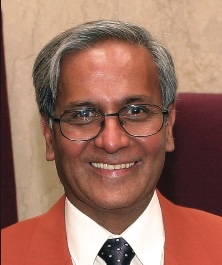BY JAY LAKHANI
Interfaith dialogue in the united Kingdom, where I live, commenced with an attitude of religions tolerating each other. This was clearly a derogatory attitude, as it suggested “giving other religions permission to exist.” The dialogue has moved forward and now parades as “respecting other religions.” This improved wording seems to be a mature attitude suited to the needs of a multi-faith society, but it is actually way off target; it merely camouflages and shields an exclusionist, non-negotiable agenda of the Abrahamic faiths. A forthright expression of their attitude would be, “I know that my faith alone is right and the others are in error, but I will not make much ado about it.” At best, this approach could reduce chances of open confrontation between people of different faiths, but it will be hardly a prescription for community cohesion! Recently, Pope Benedict xvi declined to participate in a multifaith prayer meeting because that could give an impression that the Catholic Church considered all religious traditions equally valid! The message seems to be, “Catholicism alone is right, all other religions are in error.”
One of the greatest challenges we face in this century is how to minimize strife perpetrated in the name of religions. Continuing to harbor exclusionist agendas is hardly the way forward. The solution lies in a word that sounds innocuous at first: pluralism. In a nutshell, pluralism means an acceptance that there can be many pathways for making spiritual progress. Spiritual progress can be made in a theistic mode; in a non-theistic mode, and even in a non-religious mode. We are all different, and this difference shows up in the way we relate to ideas of spirituality. Each founder of a religion promoted a unique pathway for spiritual progress, tailored to suit the needs of his particular society. Over time these teachings became the various religions. Every religion can be viewed as suited to the needs of its context. The destination they promise may be absolute, but the pathways themselves cannot be absolute. They are always relative, because they have to relate to people.
When any religion attempts to impose its doctrines on others, it turns into an explosive device. One would expect that mature theologians would recognize the seriousness of the situation and eagerly affirm that there can be many roads leading to spiritual progress, their own religion being a valid and important one. But my experience suggests otherwise.
Theologians firmly committed to exclusivism claim to have a monopoly on the Divine. God has been so well encapsulated within their system of doctrines and dogmas that how could He escape and make an appearance in another religion? If any system, however esoteric, manages to capture God within its framework, then by definition that system has superseded God. It is a sound conclusion that a God easily confined by an intellectual religious system is hardly worth bothering with.
Pluralism is often thought to imply relativism, giving it a bad reputation in religion studies since many believe it means that there is no absolute and hence anything goes. But pluralism has never suggested that. It simply states that there will be diversity in prescriptions adopted by different groups, because they reflect different starting points. This is not relativism; it is a recognition of the role and limitations of contextual elements that permeate the religious process. Pluralism is not an acceptance that all religions are the same. Claiming that all religions are the same would be ludicrous. Nor should pluralism be viewed as an attempt to homogenize world religions. All religions are distinctly different, each valuable and sacred in its own uniqueness. What is needed is not watering down religions but rather developing deeper insight into them. Such maturity allows us to appreciate the scope of religious teachings while recognizing their limitations. Until we see religions once again becoming the cohesive force in our truly pluralistic society, striving for a reformation is essential.
One casualty from the rise of pluralism will be the proselytizing agendas of missionary religions. I suspect that this is the real reason why there is such resistance to the simple but potent concept of pluralism. Arguably the evangelizing lobby is the most active and powerful force in most organized religions. Pluralism will greatly restrict their fire power. I suspect that it is not spiritual but monetary considerations that are blocking the acceptance of pluralism by the modern world.
I am labelled an “evangelical pluralist” in the interfaith circuit in the United Kingdom. Some evangelist Christians shun me and tell me that I am a more forceful evangelist than they could ever be! I treat this as a compliment, because it suggests that broader ideas of spirituality are winning over the narrow ones. Pluralism is not a new form of religion; it is simply the recognition of religion’s inherently varied roles and nature.
Hindus recognize the virtues of this approach. The Katha Upanishad states: “This Atman Supreme cannot be captured by discourses or by a sharp intellect, or even by teachings of the scriptures.”
Jay Lakhani is Director of the Vivekananda Centre, London, and Education Director of the Hindu Council UK. hindu@btinternet.com
